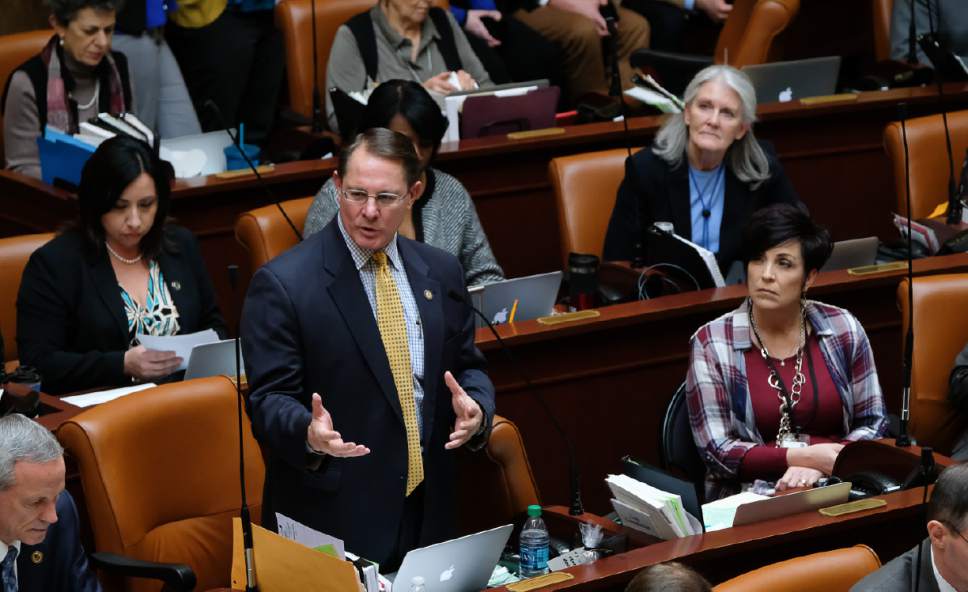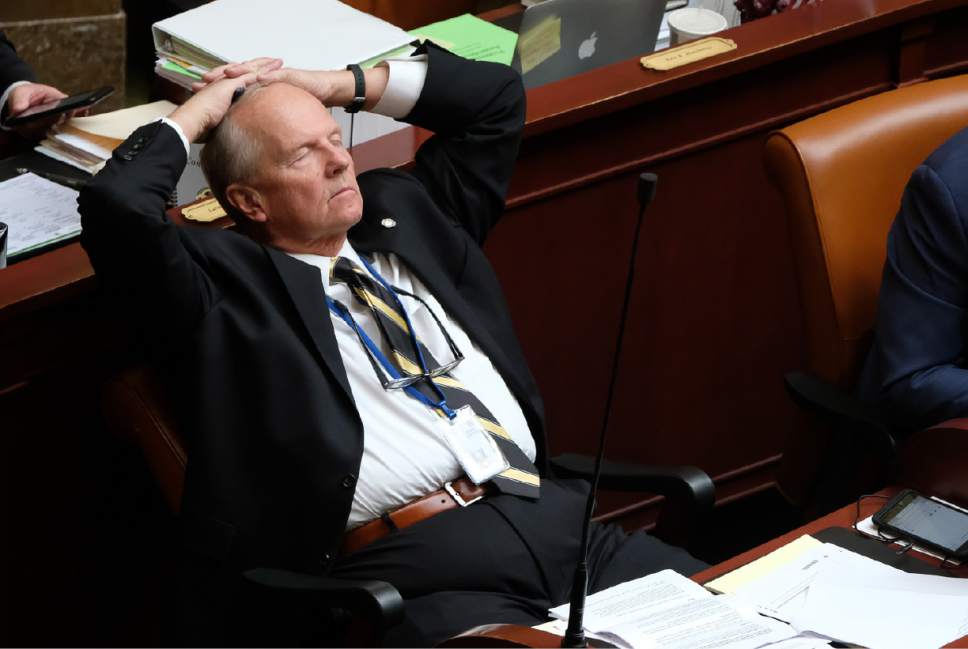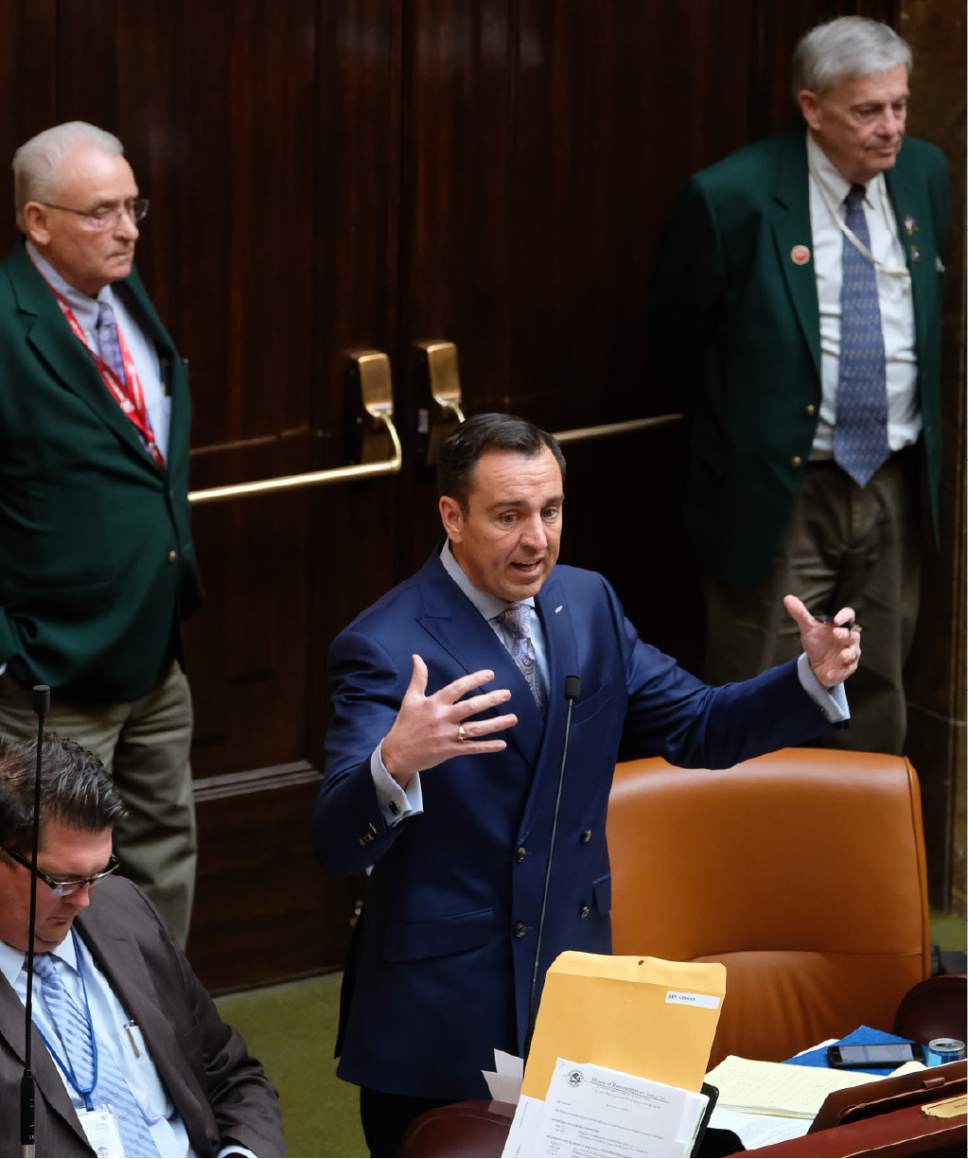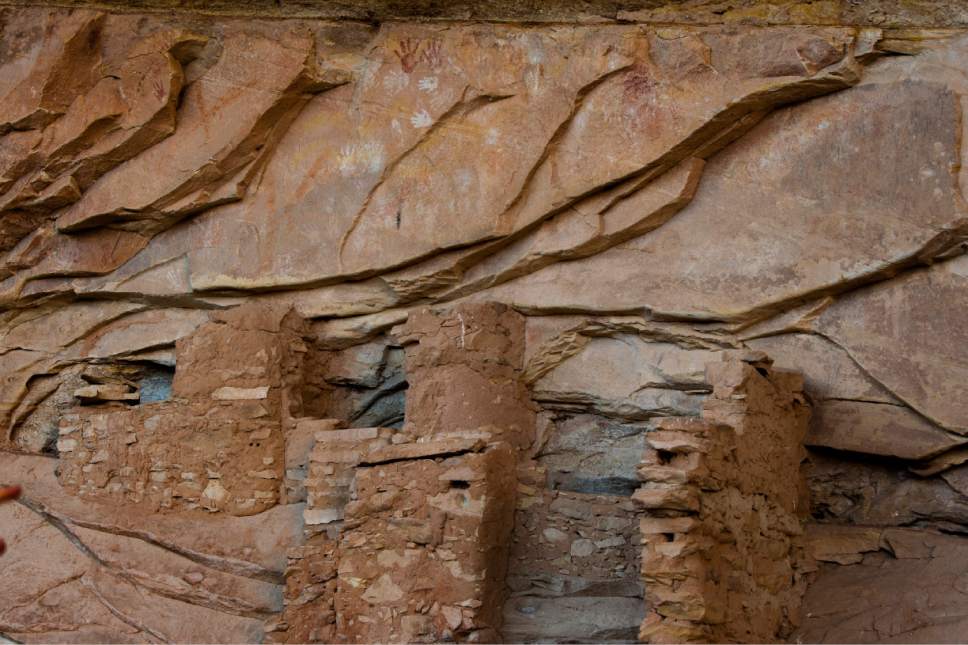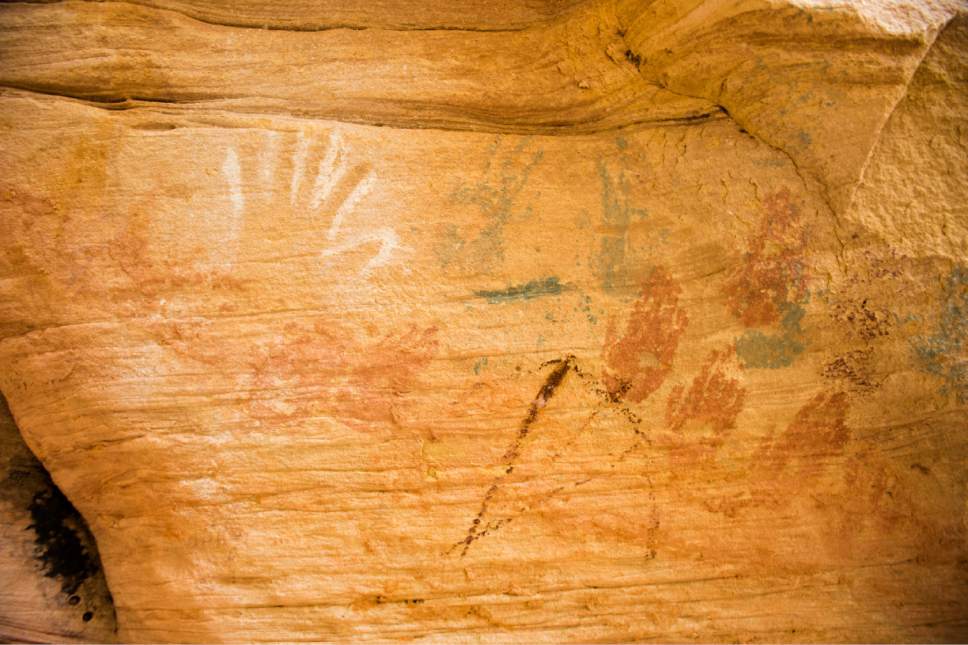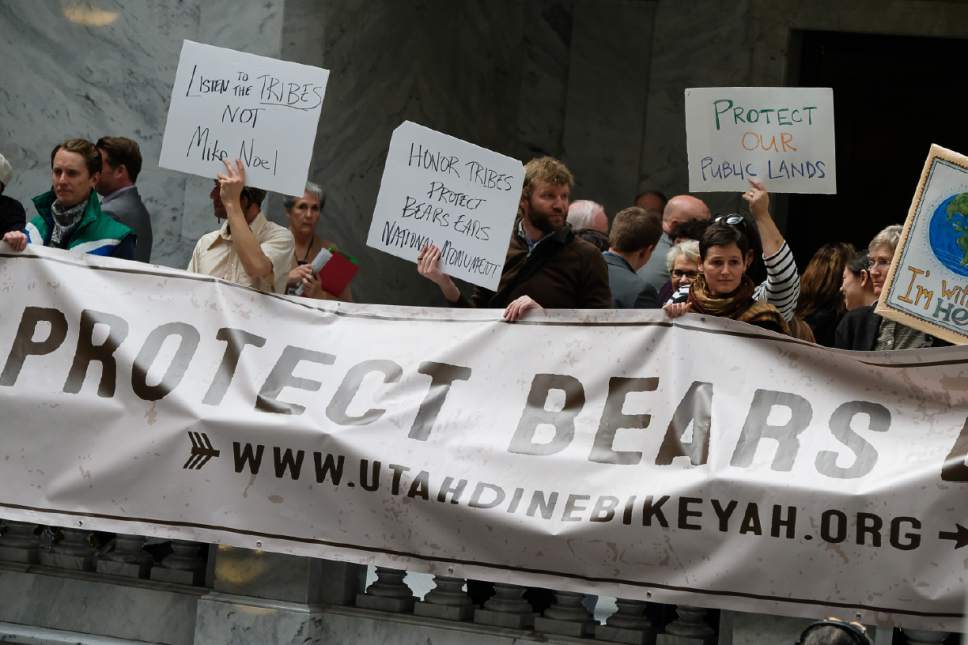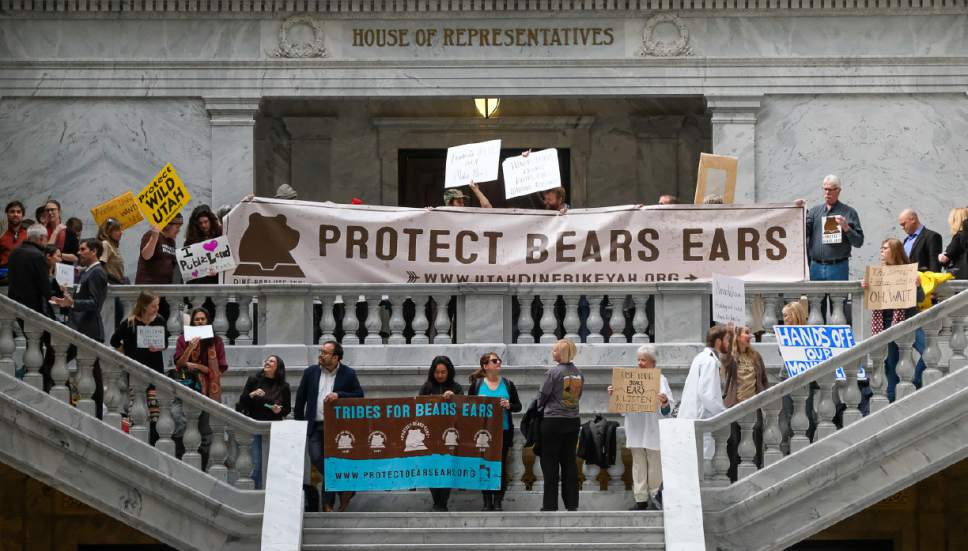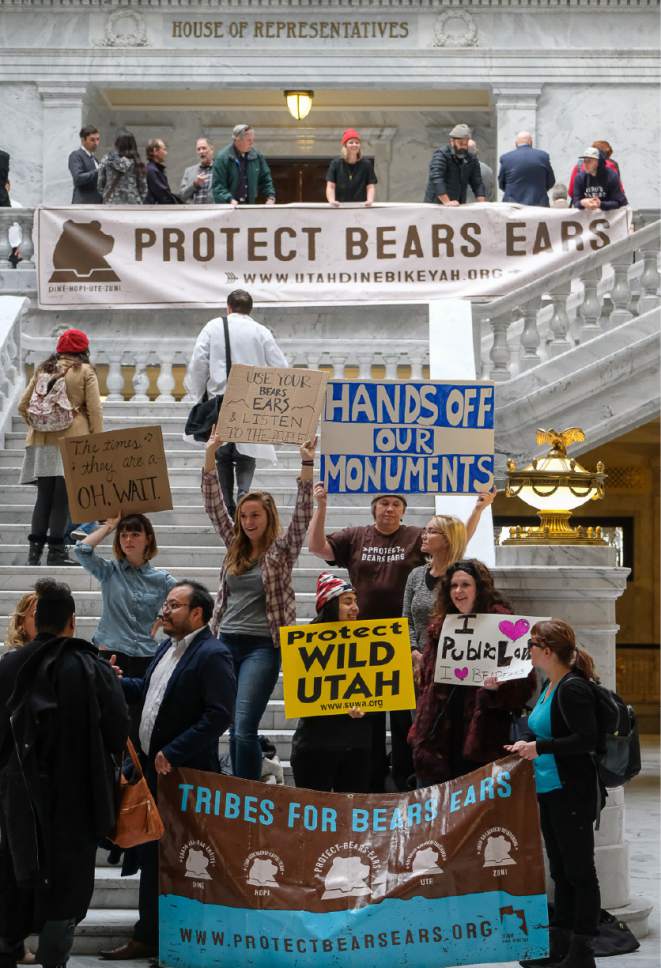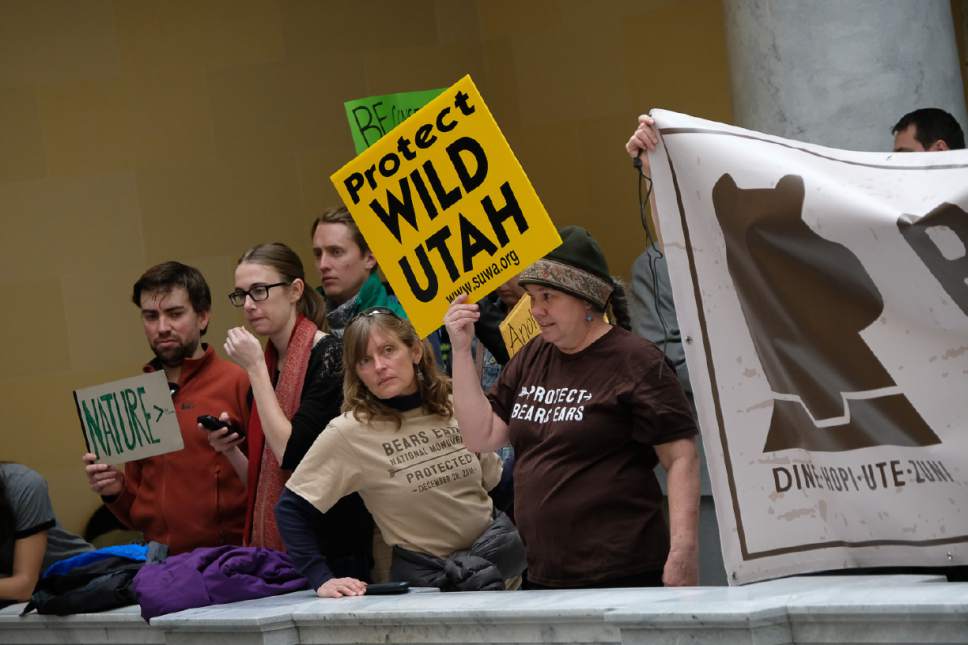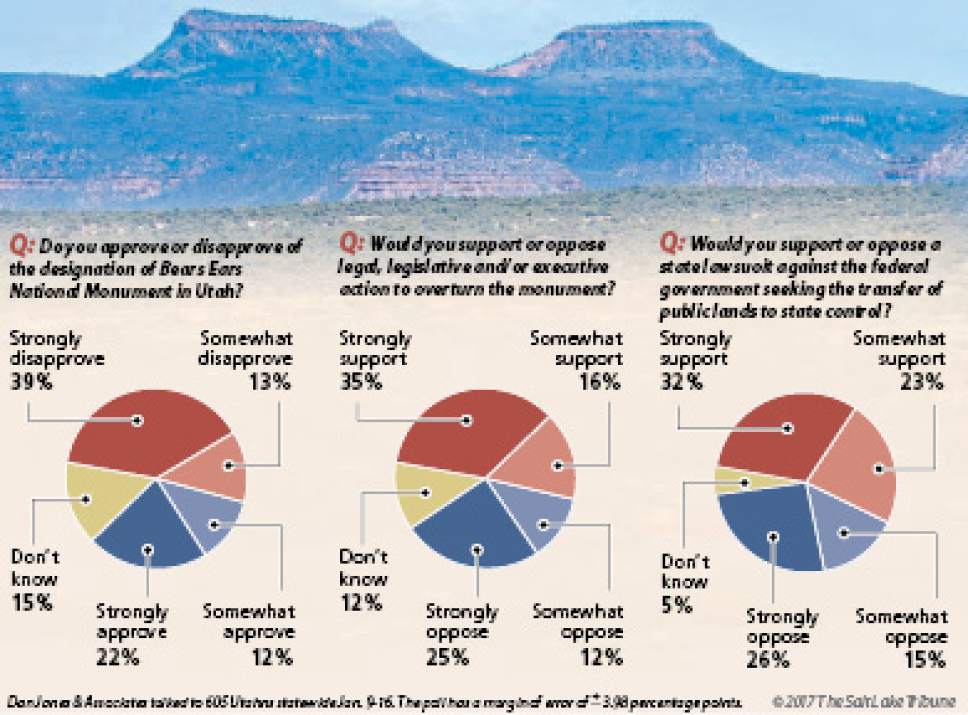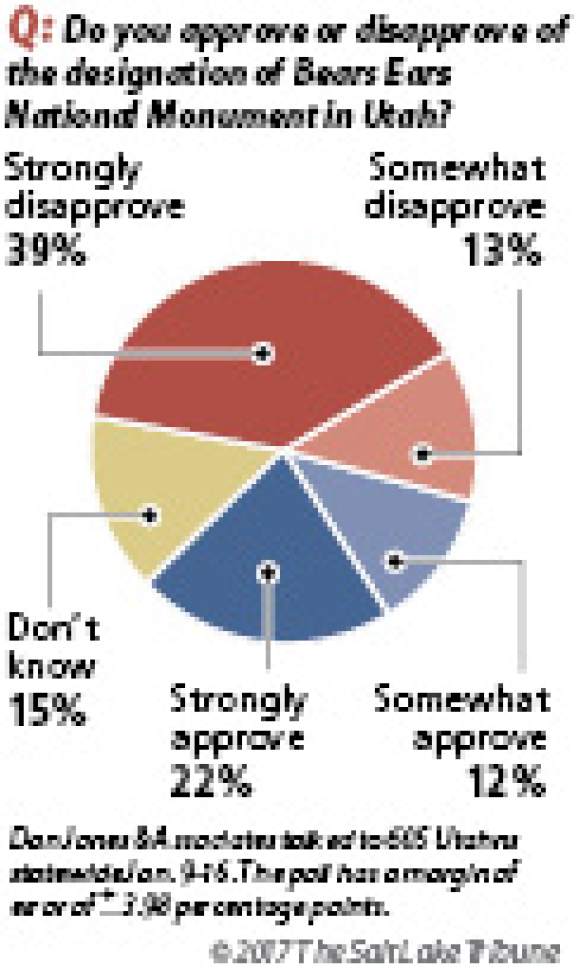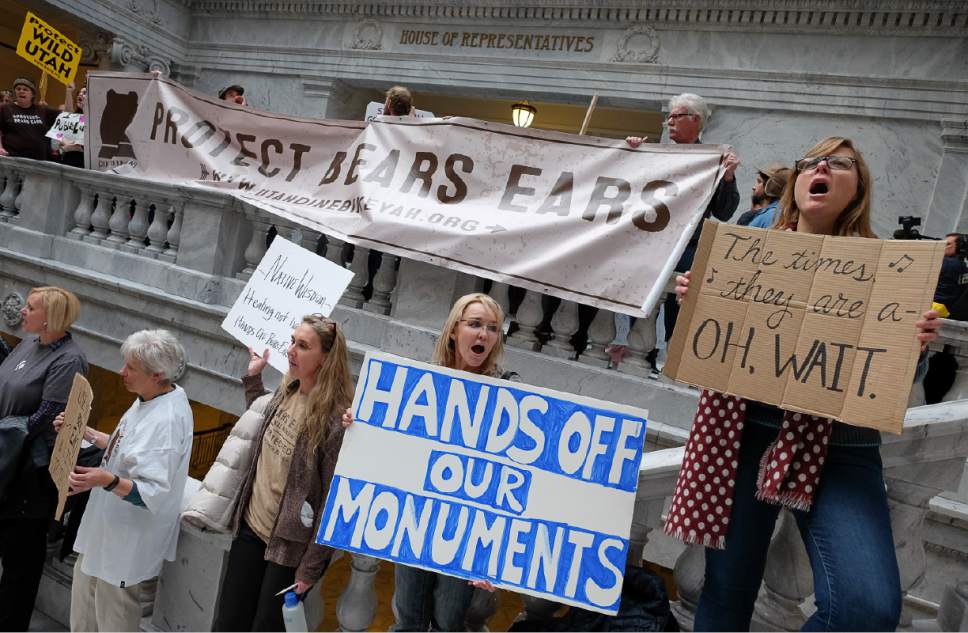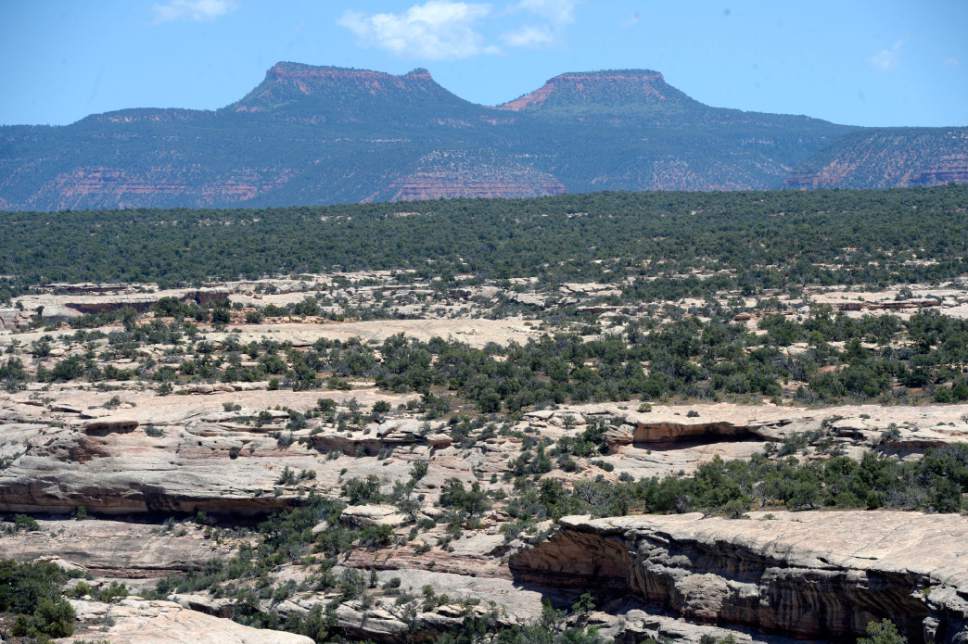This is an archived article that was published on sltrib.com in 2017, and information in the article may be outdated. It is provided only for personal research purposes and may not be reprinted.
With protesters noisily chanting nearby Tuesday, Republican lawmakers passed controversial resolutions seeking to erase the new Bears Ears National Monument and trim Grand Staircase-Escalante.
On a largely party-line 60-14 vote, the Utah House sent HCR11 to the Senate, where leaders promised a full committee hearing on the measure that asks President Donald Trump to rescind the 1.35 million-acre Bears Ears designation proclaimed by his predecessor on Dec. 28.
As state leaders continue mobilizing against Bears Ears, new polling shows that most Utahns oppose the designation and support legal, executive or legislative action aimed at overturning the designation.
The Salt Lake Tribune-Hinckley Institute of Politics survey polled 605 registered voters between Jan. 9 and Jan. 16 to gauge their positions on Bears Ears and other subjects.
More than half (52 percent) opposed the monument designation compared with 34 percent in support, with a margin of error of plus or minus 3.98 percentage points. The split was narrower for women, with 45 opposed vs. 37 percent in favor.
Thirty-nine percent of all respondents said they strongly opposed the declaration, in contrast with the 22 percent who voiced strong approval.
The poll suggests Utahns are far more divided than the state's political leadership wants to acknowledge. Republican lawmakers continue to assert a virtual consensus exists among state residents in opposition to the Bears Ears designation.
Those divisions were apparent Tuesday morning outside the House chambers on Capitol Hill as lawmakers debated the resolution and a companion bill aimed at trimming the 20-year-old Grand Staircase-Escalante National Monument. A few dozen people chanted "public lands in public hands" and held signs including, "Use your Bears Ears and listen to the people."
The protest was organized by Moroni Benally, co-founder of the Utah League of Native American Voters.
"We believe in the protection of Native American sacred sites," Benally said. "That is what Bears Ears National Monument does." He said the push to rescind the monument "really demeans tribal sovereignty."
Monument critics cite an alleged toll suffered by communities surrounding Grand Staircase to support the assertion that setting aside Bears Ears will devastate San Juan County's economy and culture.
They also say the Obama administration relied on misinformation, was unduly influenced by "special interests" and disregarded local sentiment to designate the monument under a misapplication of the 1906 Antiquities Act — even though that designation came at the request of American Indian tribes in the Four Corners area.
"There is a no space, no light between the shoulder-to-shoulder opposition to the designation that took place between our federal delegation to our legislative leaders and our county commissioners," said House Speaker Greg Hughes, R-Draper, the sponsor of the resolution calling on Trump to rescind the Bears Ears designation.
Rep. Brian King, D-Salt Lake City, argued there is plenty of enthusiasm for monuments among his constituents and insisted such designations support economic diversification, whereas reliance of resource extraction is a recipe for stagnation.
"To suggest that the Grand Staircase-Escalante is a drag on those things is not borne out be the facts," said King, whose grandfather ranched in Garfield County.
The monument controversy is unfolding against the backdrop of Utah's effort to take control of 31 million acres of public land.
Separate Tribune-Hinckley polling has found Utahns are also sharply divided over a proposed lawsuit to accomplish the land transfer, which conservationists view as a land seizure to benefit extractive industries. Many legal scholars question the state's legal footing to assert a claim to these lands and such a suit is expected to cost taxpayers $14 million.
Respondents favored filing the suit by a margin of 55 percent to 41 percent; most had strong feelings one way or the other, showing how divisive the issue is.
The Bears Ears polling numbers had a slightly wider spread, with majorities expressing strongly held views. Political conservatives and members of The Church of Jesus Christ of Latter-day Saints were more likely to oppose the monument and support action to overturn it, while Democrats overwhelmingly favored the monument. Independents narrowly favored the monument by 42 percent to 41 percent.
Republicans remain angry about what they see as Obama's "unilateral" action despite his administration's outreach to San Juan County during the months leading up to the designation, which Rep. Keven Stratton, R-Orem, denounced as "a repulsive act of political cronyism."
"We do not need this designation to honor and revere the sacred treasures within our borders," Stratton said. "It's about process not protection."
Critics of the resolutions noted that various tribal councils, as well as six of the seven Utah Navajo chapters, passed resolutions in support of the Bears Ears designation.
"In essence we're doing the same thing to the tribes as some of us perceive the federal government is doing to us here in Utah. For many tribal citizens, this land is sacred and worthy of protection," said Rep. Angela Romero, D-Salt Lake City. "We should do all what we can to protect the freedoms of all religions and all Americans, especially Native Americans."
The most contentious issue over monuments centers on whether they thwart or nourish economic activity. Rep. Mike Noel, a Kanab Republican whose district includes both monuments, said the Grand Staircase has locked up $2 trillion worth of high-quality, low-sulfur coal 700 feet under the Kaiparowits Plateau and put an end to a vibrant film industry.
"Once-thriving rural Utah communities and their citizens are suffering economic deprivation at the hand of their own federal government, which a national monument tourism economy fails to alleviate," HCR11 states. The Bears Ears designation "will forever remove the possibility of economic development and decimate the economy of the region with impacts felt around the state."
The Grand Staircase resolution, HCR12, makes similar assertions, repeating the oft-cited enrollment drops at Escalante High School as evidence that the monument has ensured that Garfield and Kane counties' leading export is children.
For Escalante business leaders, however, that enrollment drop is more a reflection of low education standards in Garfield County School District. They say their town is thriving economically and credit the monument, designated out of the blue in 1996 by then-President Bill Clinton.
"We have a clinic, pharmacy, a dentist, a home center. All that is progress," said chamber leader Dennis Waggoner, proprietor of Escalante Outfitters. "We can't get enough skilled labor here to build the things we need. A town that is dying doesn't have a housing shortage."
Other chamber members tried to meet with Hughes on Tuesday morning, but he declined to speak with them, according to Escalante builder Mark Austin. That perceived slight came after the House Rules Committee was criticized for holding an unusual hearing, in violation of House rules, that took public testimony only from monument opponents.
Reporter Lee Davidson contributed to this report. Brian Maffly covers public lands for The Salt Lake Tribune. Brian Maffly can be reached at bmaffly@sltrib.com or 801-257-8713.
Twitter: @brianmaffly



